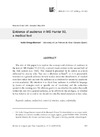Identificador persistente para citar o vincular este elemento:
https://accedacris.ulpgc.es/jspui/handle/10553/7068
| Campo DC | Valor | idioma |
|---|---|---|
| dc.contributor.author | Ortega Barrera, Ivalla | - |
| dc.date.accessioned | 2012-03-02T02:31:00Z | - |
| dc.date.accessioned | 2018-03-08T13:15:00Z | - |
| dc.date.available | 2012-03-02T05:00:18Z | - |
| dc.date.available | 2018-03-08T13:15:00Z | - |
| dc.date.issued | 2010 | - |
| dc.identifier.issn | 1133-1127 | - |
| dc.identifier.other | WoS | - |
| dc.identifier.uri | https://accedacris.ulpgc.es/handle/10553/7068 | - |
| dc.description.abstract | The aim of this paper is to explore the concept and evidence of audience in the text of MS Hunter 93 (T.4.10), a remedy book written in the second half of the 16th century (c.a. 1565). This manual is presented by its author as a book addressed to anyone who “has not a physician at hand”, so it is presumably intended to a general audience. Several studies about the classification of medical texts have taken into account the audience as a criterion for taxonomy (academic or non-academic). My intention is to show how audience is codified in language by means of strategies such as specific use of vocabulary and the authorities quoted in the running text. My ultimate goal is to see whether the author has really written his text for a general audience, as he affirms in the prologue, or whether he has failed to do so and so we should not take his initial statement at face value. | - |
| dc.format | application/pdf | - |
| dc.language | eng | - |
| dc.relation.ispartof | LFE. Revista de Lenguas para Fines Específicos | - |
| dc.source | LFE. Revista de lenguas para fines específicos. Las Palmas de Gran Canaria: Universidad de Las Palmas de Gran Canaria, 1993 [ISSN 1133-1127], n. 15-16, p. 183-203 | - |
| dc.subject | 570107 Lengua y literatura | - |
| dc.subject | 550510 Filología | - |
| dc.subject.other | Audience | - |
| dc.subject.other | Medical Text | - |
| dc.subject.other | Context Of Situation | - |
| dc.subject.other | Recipes | - |
| dc.subject.other | Evidentiality | - |
| dc.title | Evidence of audience in MS Hunter 93, a medical text | - |
| dc.type | info:eu-repo/semantics/article | - |
| dc.type | Article | - |
| dc.identifier.isi | 000219400000008 | - |
| dc.compliance.driver | 1 | - |
| dc.identifier.absysnet | 233536 | - |
| dc.identifier.crisid | 3570 | - |
| dc.identifier.eissn | 2340-8561 | - |
| dc.description.lastpage | 203 | - |
| dc.description.firstpage | 183 | - |
| dc.relation.volume | 15-16 | - |
| dc.investigacion | Artes y Humanidades | - |
| dc.rights.accessrights | info:eu-repo/semantics/openAccess | - |
| dc.type2 | Artículo | - |
| dc.contributor.daisngid | 17060024 | - |
| dc.description.numberofpages | 20 | - |
| dc.contributor.wosstandard | WOS:Ortega-Barrera, I | - |
| dc.date.coverdate | 2009 | - |
| dc.identifier.ulpgc | Sí | es |
| dc.description.esci | ESCI | |
| dc.description.erihplus | ERIH PLUS | |
| item.grantfulltext | open | - |
| item.fulltext | Con texto completo | - |
| crisitem.author.dept | GIR Discourse, Communication and Society | - |
| crisitem.author.dept | Departamento de Filología Moderna, Traducción e Interpretación | - |
| crisitem.author.orcid | 0000-0003-2155-9092 | - |
| crisitem.author.parentorg | Departamento de Filología Moderna, Traducción e Interpretación | - |
| crisitem.author.fullName | Ortega Barrera, María Ivalla | - |
| Colección: | LFE, Rev. leng. fines específ. n.15-16, 2009-2010 Artículos | |
Visitas 5
60
actualizado el 11-ene-2026
Descargas
17
actualizado el 11-ene-2026
Google ScholarTM
Verifica
Comparte
Exporta metadatos
Los elementos en ULPGC accedaCRIS están protegidos por derechos de autor con todos los derechos reservados, a menos que se indique lo contrario.
